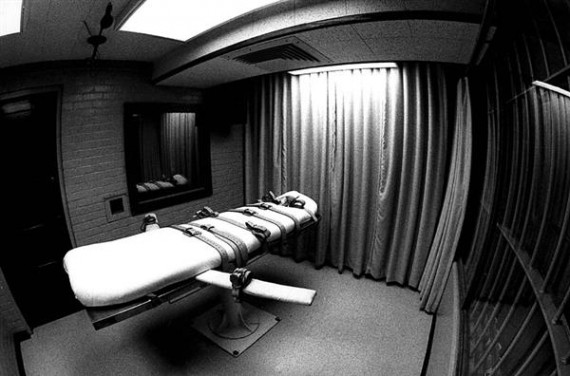Majority Supports Life Without Parole Over Death Penalty For Murder
A turning point in public opinion?
A new poll shows that, for the first time, a majority of Americans favor life in prison without parole over the death penalty:
For the first time, a majority of Americans prefer that convicted murderers spend life in prison rather than receive the death penalty, a new poll says.
According to a new Washington Post-ABC News poll released Thursday, 52 percent of Americans say they would prefer that people convicted of murder spend life in prison with no chance of parole, compared to 42 percent who prefer the death penalty for those people. That marks the first time in the Post-ABC News poll that a majority of Americans have preferred a life sentence for convicted murderers.
The net rating has shifted 14 percentage points in favor of a life sentence since 2006.
The survey comes more than a month after the botched execution of Oklahoma man Clayton Lockett. Lockett ultimately died of a heart attack after a failed lethal injection left him “writhing and clenching his teeth on the gurney,” according to an Associated Press report in April.
Most Americans still back the death penalty, the poll says, but that support has declined in recent years. Thursday’s poll reports that 60 percent of Americans support the death penalty, down from almost two-thirds support in surveys in 2002-06. Support for the death penalty was at 80 percent in 1994.
Thirty-seven percent of Americans oppose the death penalty, according to the survey.
A Gallup poll released last month reported that 61 percent of Americans view the death penalty as morally acceptable, down 10 points since 2006.
It’s important to be clear about what we’re seeing here. It’s not so much that the American public is rejecting the death penalty or turning away from it on moral or other grounds, although the fact that the overall approval for capital punishment has declined over the past decade is certainly significant. Instead, we’ve now got a majority of people who say that they would rather see a murderer spend the rest of their life in prison than sent to death row, where they’re likely to spend decades before getting anywhere near an execution date in any case. Thanks to either legislative action or court decisions, several states have already moved in this direction, with states such as New York and New Jersey, which had both revived the death penalty as a sentence after the Supreme Court’s opinion in Gregg v. Georgia which ended what had effectively been a moratorium on the death penalty in the wake of the earlier decision in Furman v. Georgia, although neither state had ever actually executed anyone. Recent controversies in Ohio and Oklahoma over the procedures involved in execution by lethal injection have brought the issue back into the forefront, with some states going so far as to bring back more barbaric forms of punishment.
There are likely several factors that have contributed to this change in public opinion.
Over the past 20 years or so, many states have radically altered the entire idea of parole for violent or repeat offenders, in some cases eliminating it entirely for certain offenses. So, unlike decades ago, the idea of “life without parole” now actually means what it says. In most states, someones who receives such a sentence would never even get the opportunity for a parole hearing, leaving aside the question of whether they’d even be granted parole. For some offenders, this strikes me as an appropriate sentence, and it is a more than appropriate alternative for a death penalty that, history has shown us, has been applied in an unfair, arbitrary, and capricious manner that often has more to do with the quality of the legal defense that a defendant can afford than it does with innocence, guilt, or the severity of a particular crime.
Additionally, since the advent of reliable DNA testing we’ve seen numerous cases of people held in prison for decades, in several cases on Death Row, for crimes they did not commit. In Texas, we’ve learned of the cases of Cameron Todd Willingham and Claude Jones, two men executed in Texas who were very likely innocent of the crimes they had been charged with. As we’ve brought cameras into the courtroom, the public has become more aware of the fact that things can go horribly wrong during a trial, either in favor of the prosecution or the defense. Given all of this, perhaps its the case that the American public has concluded that risking life or death in those circumstances simply isn’t worth it.
The big question, of course, is whether this will lead to changes in the law. Obviously, we’re unlikely to see states like Texas abandoning the death penalty any time soon, but this change in public opinion could have a huge impact in states where the enthusiasm for execution isn’t quite so gung-ho as it is in the Lone Star State such as Pennsylvania, Ohio, and others where executions have been far less common than they have in Texas, Oklahoma, and Virginia. Additionally, the ongoing problems that states are having obtaining the drugs used in executions, caused in no small part by the fact that the companies that make them are becoming less willing to sell them to the states for purposes of killing, is likely to slow the pace of executions nationwide for some time to come. Perhaps all of these factors combined will speed up the day that we finally put this unfortunate practice behind us.







Every life is precious…until you know…they are actually a life. Then not so much.
I think those involved in these cases, who pushed for the death sentence or made the mistakes that led to the death sentence, should spend the rest of their lives in prison without parole. How about a little accountability?
If we develop a perfect system with zero chance of making a mistake then we can discuss the death penalty. Until then…not interested. It’s the height of hubris to think you are somehow qualified to judge and take another’s life.
People say that about the death penalty as though it were the only government policy where mistakes can get innocent people killed. Nothing could be further from the truth. By that logic we should abolish parole, which has surely resulted in more innocent deaths than the highest plausible number of capital punishment “oopsies.”
@Jeff:
That’s a non-sequitur. In one case its criminals taking “advantage” of the system (though I’d love to see actual statistics of crimes committed while on parole to understand the size and scope of the problem). In the issue at question it is the GOVERNMENT killing people who are not guilty of crimes.
It’s entirely within the power of local government to abolish parole as there is no constitutional *right* to parole.
The issue is that there is significant evidence that people are put to death for crimes that they *did not* commit. In the face of that mounting evidence, why are we continuing executions?
I challenge any small government/”we can’t trust the government” people to rationalize why we can trust otherwise untrustable governments to execute citizens. Especially those conservatives who were up in arms along with Rand Paul about drone attacks on US Citizens.
So we lock someone up for life without parole. While in prison, they kill another inmate or a guard. What’s the penalty they face?
@Matt Bernius:
There will be no answer forthcoming, at least not one that addresses that the “trust government” issue directly.
I honestly believe that it comes down to whether or not people want the ultimate revenge and/or retribution (execution) or not. I do not believe that the Death Penalty is a deterrent to criminals, I do not believe that the government always convicts the right person, nor do I believe that wrongful convictions are so rare as to be a non-factor in considering the efficacy of the Death Penalty.
Life without parole (unless exculpating evidence is found that could exonerate the convicted person) is where I’ve been on this issue for a long time.
@Jenos Idanian #13:
Here are reasoned answers to the polemical question you just posed:
http://ejusa.org/learn/prison%20killings
Sourcing to the studies from which these draw is available on the source page.
@Jenos Idanian #13:
Do we not have that situation right now? This is not new.
@al-Ameda: Yes, we have that situation right now. And what happens?
The killer gets a few weeks of daily trips out of prison to court (a nice change of scenery) for his new trial, at the end of which he’s sent right back with a second life without parole. And the next time he feels like getting a break from prison, he tries to kill someone else again.
Alternately, he’s never actually charged, and the murder goes unpunished. So he has absolutely no incentive to not kill again, and a chance of a change of scenery if he does.
If we’re lucky, he only kills another inmate, preferably another serving life without parole.
@Jenos Idanian #13:
You’re kidding, right?
Glad progress toward sanity and justice is being made.
@al-Ameda: Google up Joseph Druce and John Geoghan.
It happened once, it can happen again.
Hell, if I was serving life without parole, I’d be tempted to do it just for the sake of changing up the routine a bit. After all, what can they do to me?
@Jenos Idanian #13:
Seriously, those cases are NOT the least bit typical.
@Jenos Idanian #13:
They should be forced to read your f’ing stupid-a$$ comments.
Big vs. small government has nothing to do with support or opposition to the death penalty. The government that says “don’t avenge your father’s murder, we’ll avenge him for you” is no bigger or smaller than the one that says “Don’t avenge your family member, and we won’t, either.” Both preempt the field entirely.
This is why I’ve moved to being mostly against the death penalty. The last two decades, in the era of the Innocence Project, has persuaded that the “error rate” on death penalty convictions is not trivial. If you believe that it is better than ten guilty men go free than one innocent man be jailed, does it not make sense to believe that it is better than ten guilty men get life without parole than one innocent man be executed?
@al-Ameda: It happened once. I appreciate your guarantee that it’ll never happen again, especially if more and more states abolish the death penalty , but I don’t have a lot of faith in it.
Would you consider accepting a compromise, and keeping the death penalty for those convicted of certain crimes while already serving life without parole?
@Jeff:
The fact you seem to skip is the fundamental question of can the government and it’s various agents be trusted to fairly investigate and administer the trial in such a way the ensures that no individual is put to death for a crime that he or she did not commit.
Given concerns about corruption and lack of protections at various levels of government, why do people believe that the court system is in any way immune to these problems — especially given how people feel its full of activist judges and overzealous politically striving prosecutors?
@Jeff:
Do you think that the issue of wrongful convictions should have any weight as to whether or not the Death Penalty remains an option for capital offenses?
@Jenos Idanian #13:
Why is this *happening once* enough to supercede the execution of prisoners for crimes that they did not commit that has happened at least *once* as well?
BTW, let us not forget that like you and others have reminded us recently about soldiers, prison guards know the potential dangers that they are in for when they sign the contracts.
Further, if your logic was true, then we should see constant attacks like these in States that abolished the death penalty. I look forward to your presentation of data rather than anecdotes to back up this position.
Apropos:
Women: (high voices) He said [Jehovah] again.
(low voices) He said it again.
Official: (to Matthias) You’re only making it worse for yourself.
Matthias: Making it worse? How can it be worse? Jehovah, Jehovah, Jehovah.
https://www.youtube.com/watch?v=R_hlMK7tCks
@Jenos Idanian #13:
That is a good question, and it should be on the table in any discussion of the Death Penalty.
I think I could support that. I’ve never understood how it is that prison could not be managed so that murderous prison violence could not happen.
@Jenos Idanian #13:
Beyond the fact that it’s clear you have no concept of what can be done to you in prison outside of the existing judicial boundaries, your entire line of thought here (down to how you even phrase your points) seems eerily reminiscent of a dear departed commenter whose name conveniently began with “J”(ay) as well. Not surprisingly, his views were not particular tethered to actual reality either:
https://www.outsidethebeltway.com/cheering-for-death-at-the-reagan-library-debate/
As a general rule, I suspect that the further people are *away* from the criminal justice system, the more that they trust it (except, of course, if it involves self defense or lacrosse players — then there’s always rampant corruption or when a criminal gets released on a technicality thanks to an activist judge).
Likewise, these people tend to believe — despite probably having watched countless prison-is-hell movies or at least an episode or two of Oz — that prison is some sort of vacation retreat.
BTW, the way that prisons keep check on their most “violent” inmates is degrees of solitary and limiting their exposure to both guards and other prisoners. And guess what, it generally speaking, works quite well.
Right now the biggest issues are with a lack of monitoring of *lower level* violent offenders. Frankly, the worst cases in recent memory all revolve around Bill DiBalsio’s attempts to “reform” the NYC prison system without adequately addressing safety issues for counselors and health care workers. That is a prime example of liberal values run amok.
http://www.nytimes.com/2014/05/22/nyregion/rising-hazard-for-civilian-staff-at-rikers-attacks-by-mentally-ill-inmates.html?_r=0
@Jeff:
And if the government avenges your father’s murder by killing some guy who didn’t actually murder your father? Do we just blow that off as “you can’t make mayonnaise without breaking a few eggs?”
Here in Oregon prosecutors rarely ask for the death penalty anymore because it’s just too expensive. A plea bargain resulting in life in prison is simply more economical. Our current governor has decreed that there will be no executions under his watch.
@Jeff:
Disagree. The government that says “we’ll avenge him for you” is bigger both numerically (you need more people to do more things) and in scope of powers (taking away a person’s life is the biggest thing you can do to him … it makes things like taking some money or possessions tiny in comparison).
Basically, if I can trust the gov’t to take away someone’s life, then I can trust them to do anything regarding an individual, because everything else they do has less consequences. I think this is the point for so many people against capital punishment – many would agree to capital punishment if it was 100% certain that the condemned was the murderer. But its almost impossible to believe that errors are never made in that process. Look at all the new studies about the reliability of witnesses for instance (or the lack of reliability) – and that’s without people testifying having their own scores to settle, etc
And giving the gov’t the scope to take people’s lives is much bigger than giving them the scope to regulate their businesses, or limit the weapons they can have etc. Its the biggest scope you have.
@Jenos Idanian #13: double life without parole!? it’s logical.
well since we’re all giddy about just leaving people behind bars for the rest of their life (on the taxpayer dime of course) then why shouldn’t they be paying back the state by cleaning up roads and doing manual labor? is that inhumane too? granted, they’ll be competing with unions so that’s bad for some.
Actually, it’s more like being sober-minded about making sure that innocent people aren’t murdered by the state…
@bill:
Of course you fail to mention that when you tally up the costs of capital trials, appeals, incarceration, and execution, the entire process of trying, convicting, and executing a prisoner costs tax payers *far more* than trying, convicting, and housing a prisoner for life without the possibility of parole.
Here’s a summary from well known liberal publication Forbes:
http://www.forbes.com/sites/kellyphillipserb/2011/09/22/death-and-taxes-the-real-cost-of-the-death-penalty/
And other well-known liberal pubs like the Economist and Fox News:
http://www.economist.com/node/13279051
http://www.foxnews.com/us/2010/03/27/just-cost-death-penalty-killer-state-budgets/
So the entire “save the taxpayers money through death penalty” argument falls flat on its face.
@ bill
Maybe we should just have firing squads out behind the courthouses. After all, bullets are cheap. And you trust the government to get all this right of course…
@anjin-san:
Why bother…cut out the middle-man and empower to cops to make the call in the field.
I wonder how these people would feel if these people were on trial: Hitler, Booth, Heinrich Himmler, Jack the Ripper, Joseph Stalin, Mao, Oswald (killed before he could talk).
@Jenos Idanian #13:
That says far more about you than the system.
@Tyrell:
Life sentences without parole for them all. Let them rot and watch their works be forgotten and see, ultimately, how little they accomplished.
Especially Hitler.
Wingnuts fantasizing about violence is hardly anything new.
@An Interested Party: no issue with that- there hasn’t been a proven “death penalty” mistake since it’s reinstatement.
@Matt Bernius: ok, but what about them doing some work for us, after all they’re going to be around for a while- all that free medical/dental/gender reassignment and such. you think they could clean up some filth along the way and earn their sentence if they get to live?
@anjin-san: well, we do give them appeals and such. this isn’t a socialist state just yet. you nazi’s just can’t wait can you?!
@bill:
Because the cases aren’t reviewed after the execution. Pretty easy to say something hasn’t been proven when it hasn’t even been tested.
Here are 144 people who have been sentenced to death and subsequently exonerated:
The Innocence List
@bill:
Provided they are paid a nominal amount, and the work they are doing is not work traditionally done by people outside of the prison system *OR* contracted out to private entities — sure, no issue there. Seeing folks in county doing road clean up is a pretty regular site around here.
But, plans to put prisoners to work picking fields for farmers — that make no sense. And frankly neither does work that allows prisoners to easily create makeshift weapons (i.e. metal shops in prisons are really not a great idea).
Of course, I’m a crazy progressive on these issues, so I’m also for GED and college courses being offered at prisons too. Even for lifers.
@Mikey:
That’s not entirely true. Reviews are rare, but they do happen — typically after agitation from the local press.
The issue is that many of the reviews that have happened have been marred by the questionable ways the reviews were carried out. For example, the Texas review of Ruben Cantu’s execution was conducted by a person who, as a judge, handled Cantu’s appeals and set his execution date. How is that not a conflict of interest?
[source]
@Matt Bernius: Cameron Willingham’s case was reviewed, too, and there was supposed to have been an official statement of exoneration, but something happened to gum up the works. Texas politics had nothing to do with this, I’m sure. (bwahahaha)
But such reviews are vanishingly rare, and I believe even if one is done that proves the execution of an innocent person, it will be quashed because such an admission would be very disruptive indeed.
@Mikey:
Here’s more on that story – http://www.texasmonthly.com/story/judge-wanted-posthumously-exonerate-cameron-todd-willingham
A judge reviewed Willingham’s case on his own and felt he should be exonerated. However, there has yet to be a state sponsored investigation.
@Matt Bernius:
My resident lawyer just reminded me that what I’m describing here is *not* a conflict of interests, but instead an issue of potential impropriety and impartiality.